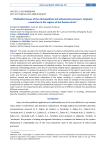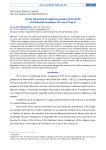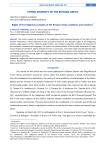Ethnic diversity of the Russian Arctic. Рубрика в журнале - Arctic and North

Статья научная
The article considers the methodic aspects of empirical ethnopolitical and ethno-social research in the regions of the modern Russia. It is demonstrated that the tools for quantitative sociological research of interethnic and interdenominational relations should be adapted for large-scale cultural-historical groups of the regions. E.g., in the case of the Russian Arctic, the indigenous small-numbered peoples are an important subject of the ethnic policy, which requires the use of additional indicators that represent their cultural development and participation in ethnopolitical relations. The toolkit of empirical cross-regional studies usually includes the measurement of individual variables. The article proposes a more complex and systematic methodology based on the idea of constructing integral indices, aggregating the values of a set of related indicators. To analyze the dynamics of the ethnic components of the region's social system, a set of categories is proposed, through which it is possible to describe the configuration of the main ethnic actors and the state of political and cultural institutions. The categories were operationalized for the political, societal and socio-cultural subsystems of the region, resulting in a system of indicators for monitoring ethnopolitical and ethno-social processes. The article shows an example of the procedure for constructing an integral index of the ethnic policy' quality (nationalities policy index) based on indicators proposed by the authors for measuring ethnopolitical processes in the region. In the end of the paper, the major issues for the measuring the data unification got with the use of different methods from qualitatively different sources is set.
Бесплатно

On the interaction of indigenous peoples of the North and industrial companies: the case of Yugra
Статья научная
In this work the author generalized and analyzed the results of a sociological study on problems of social and economic development of the territories of the traditional environmental management (TTEM) of the indigenous ethnic groups of the North (IEGN). The purpose and research problems are consisted in obtaining information on economic and social conditions of territories of traditional environmental management and a condition of the IEGN’s crafts. The results of a sociological research show, the main motive for traditional economic activity among the IEGN is preservation of the traditional lifestyle. Most of respondents believe that relationship between of the TTEM owners and subsoil users must be based only on a contractual basis (economic agreements). More than a half of respondents believe that the economic agreements concluded between subsoil users and the TTEM owners can partially compensate their expenses and provide communities. On the other hand, an insignificant part of respondents shows mistrust to this form of the relations, saying that the economic agreement is just a formality. Only an insignificant part of respondents noted that their relations with subsoil users were conflict.
Бесплатно

Rights of the indigenous peoples of the Russian Arctic: problems and solutions
Статья научная
The article reveals the situation of the indigenous small-numbered peoples of the North of the Russian Federation; it draws attention to the unresolved issues of the collective rights of the indigenous peoples, legal aspects of their ethnicity, public health, and reindeer husbandry, industrial development of the territories, education and language. The author has noted activities of the Russian Association of Indigenous Peoples of the North, Siberia and the Far East. In conclusion, the author states that despite the exist-ing shortcomings because of the self-sufficient public-state and ethnic policy, in the Russian Arctic, there is an ongoing system of ensuring rights of indigenous small-numbered peoples, their traditional way of life and economic activities.
Бесплатно

